LAKEWOOD, NJ – Is Thanksgiving allowed? That is a question that has been debated by Jews living in America for many years. And there are many answers to the question.
As the United States celebrated Thanksgiving, a unique aspect of this holiday emerges within the American Jewish community, particularly among those adhering to Orthodox Judaism. This exploration delves into the historical origins of Thanksgiving and its halachic (Jewish legal) considerations, especially in the context of “Chukos HaGoyim,” the prohibition against imitating non-Jewish customs.
Historical Roots of Thanksgiving Thanksgiving traces its origins to the early 17th century, with the Pilgrims’ 1621 celebration at Plymouth, Massachusetts, acknowledging a bountiful harvest with the help of Native Americans. It evolved from local observances to a national holiday, with varying interpretations of its religious or secular nature. The holiday, as instituted by President Abraham Lincoln in 1863, has since been an annual national event.
Halachic Analysis: Religious or Secular? From a halachic standpoint, determining whether Thanksgiving is a religious or secular holiday is crucial. Early observances with explicit thanks to God suggest a religious undertone. However, the modern interpretation of Thanksgiving, focused on family gatherings, food, and leisure activities, indicates a largely secular celebration.
While a Thanksgiving celebration might include prayer, the day itself is not seen by goyim as a religious day, but just as a non-religious day of thanks for the things we can appreciate in life.
Chukos HaGoyim and Thanksgiving The concept of “Chukos HaGoyim” in Jewish law cautions against adopting non-Jewish customs with idolatrous or irrational roots. Leading halachic authorities, such as the Rambam, Tur, and Shulchan Aruch, define this prohibition, with variations in interpretation among Tosafos, Ran, and Maharik. The key criterion is the custom’s connection to idolatry or lack of logical basis.
Contemporary Rabbinic Opinions Diverse views exist among contemporary rabbinic authorities regarding Thanksgiving observance:
- Rav Moshe Feinstein: In his response, Feinstein initially expresses reservations about Thanksgiving celebrations but later permits them, provided they are not regarded as obligatory annual events.
- Permissive Stance: Authorities like Rav Eliezer Silver and Rav Yosef Dov Soloveitchik permit partaking in Thanksgiving, seeing it as a secular day of gratitude rather than a religious observance.
- Restrictive Stance: Other rabbis, including Rav Yitzchok Hutner and Rav Menashe Klein, oppose Thanksgiving celebrations, viewing them as potentially rooted in non-Jewish religious practices.
The American Jewish community navigates these diverse halachic perspectives, particularly within Orthodox circles. While some view the holiday as a permissible expression of gratitude and cultural integration, others caution against its potential religious connotations. This dichotomy reflects the broader challenge of balancing religious identity with participation in a multicultural society.

